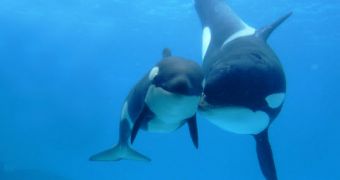A report only recently published in the journal Biogeosciences Discussions argues that some marine creatures – whales, in particular – are crucial in making sure nutrients get to where they are most needed.
Thus, when swimming, the whales continue to move their massive Tails up and down through the water. As these marine mammals spend time both at the surface of the water, and close to the sea's bottom, their movements help nutrients navigate across these “layers” of our oceans.
Apparently, but for whales carrying out this job of mixing up the nutrients found in aquatic ecosystems, most of the life forms now found in our oceans would cease to exist sooner than one might expect.
More so since chemical compounds such as nitrogen and iron are typically only abundant in the deep and need somehow be brought closer to the surface so that other animal species might benefit from them.
According to Our Amazing Planet, Stephen Nicol, a marine biologist working with the University of Tasmania in Australia, makes a case of how, “A lot more work needs to be done to prove this. The growing likelihood that life plays an important role in transporting nutrients doesn't greatly surprise most biologists, but physical and chemical oceanographers don't like the idea at all and are deeply suspicious of it.”
Interestingly enough, the scientists who looked into this issue also claim that, as unbelievable as it might seem, smaller animals also play a very important part in keeping things moving in our oceans, especially if said animals travel in packs or shoals and, therefore, create a lot of agitation when making their way through the ocean.
Should it be proven without a shadow of a doubt that sea creatures are as important as tides and winds in mixing up the nutrients present in marine ecosystems, it is quite likely that our current assumptions regarding ocean circulation will need be reconsidered.
From where we stand, this hypothesis also stands as proof that natural ecosystems are very carefully balanced and interfering with this equilibrium might result in severe consequences nobody would have expected.

 14 DAY TRIAL //
14 DAY TRIAL //